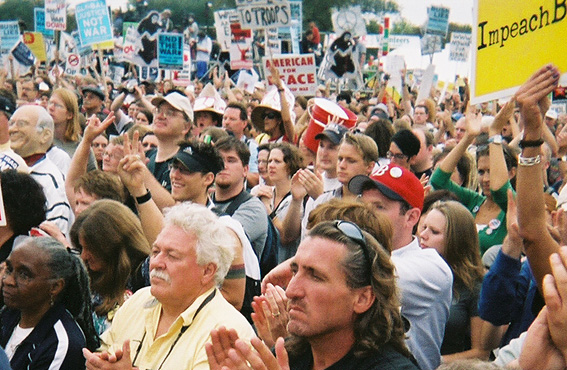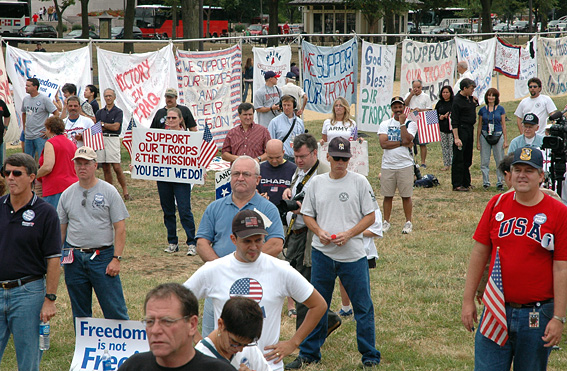

September 25, 2005-Rally to Honor Military Families. (more photos).
 |
| September 24, 2005-Rally and March to End the War in Iraq. (more photos) |

September 25, 2005-Rally to Honor Military Families. (more photos). |
|
Democray
in Action photos.
|
A number of conservative groups including Move America Forward, RightMarch.com, and FreeRepublic.com sought to counter "Cindy Sheehan and her radical left-wing friends." They organized a "Support The Troops and Their Mission Weekend," a highlight of which was the Rally to Honor Military Families on the Mall on September 25. However, this event only drew hundreds of people; one estimate put the crowd at 400. Addressing this crowd Sen. Jeff Sessions (R-AR) stated, "We are on a mission to do good for this world. We are not going to stop."
It was almost three years ago, back in October 2002, as President George W. Bush warned of the "gathering threat" posed by Iraq, that Congress approved a resolution authorizing use of force; the vote was 296 to 133 in the House and 77 to 23 in the Senate. Five months later, on March 19, 2003, President Bush addressed the nation, declaring, "American and coalition forces are in the early stages of military operations to disarm Iraq, to free its people and to defend the world from grave danger." Operation Iraqi Freedom, as it was soon dubbed, appeared to go well and on May 1, President Bush flew to the USS Abraham Lincoln and announced the end of major combat operations.
Now, after two and a half years of war, more than 1,900 U.S. soldiers have been killed (in hostile and non-hostile action) in Iraq and thousands of troops wounded, in addition to the casualties suffered by Iraqi civilians. According to the National Priorities Project, the war in Iraq has cost U.S. taxpayers about $200 billion. During the 2004 campaign the war in Iraq was an issue, but Democrats proved unable to capitalize on it. Leading candidates, including the nominee Sen. John Kerry, Sen. John Edwards and Rep. Dick Gephardt, had voted to authorize use of force. Republicans portrayed Kerry as having shifting positions on the war, and constantly reminded voters of his statement that, "I actually voted for the $87 billion before I voted against it."
In Iraq there have been positive steps. On Jan. 30, 2005 Iraqis voted on a 275-member Transitional National Assembly, and on Oct. 15 they are scheduled to vote in a referendum on the draft constitution. However, near daily reports of attacks by insurgents create a strong impression of chaos. Here in the U.S. public support for the war in Iraq has declined. In the past couple of months anti-war activists have been energized by Cindy Shaheen's vigil outside Bush's ranch in Crawford, Texas in August and more especially by the need to rebuild after Hurricane Katrina.
Throughout, Bush has emphasized the need to stay the course. For the most part, Republicans and Republican 2008 presidential prospects have backed the President. An exception is Sen. Chuck Hagel (R-NE), who has been critical and in August compared the situation in Iraq to Vietnam, stating, "The longer we stay, the more problems we're going to have."
Most top Democratic leaders have generally criticized the prosecution of the war, calling for a smarter and better run campaign, but eschewing timelines or withdrawal scenarios. For example in a June address at the Brookings Institution, Sen. Joe Biden (D-DE) argued that "the administration should develop with Congress clear benchmarks and goals in key areas: security, governance and politics, reconstruction and burden-sharing." Gen. Wesley Clark (ret.) states that it would be "a mistake now to pull out, start pulling out, or set a date to pull out. Instead we need a strategy to create a stable democratizing and peaceful state in Iraq – a strategy the Administration has failed to develop and articulate."
Some Democrats have gone further.
In June 41 House members formed the "Out of Iraq Caucus." On June
15, Rep. Neil Abercrombie (D-HI) introduced the "Withdrawal of United States
Armed Forces From Iraq Resolution of 2005 -- Homeward Bound" (H.J. Res.
55) which calls for withdrawal of U.S. forces "as soon as possible but
not later than October 1, 2006;" the bill now has 58 co-sponsors.
Sen. Russ Feingold (D-WI), a potential '08 presidential candidate, has
suggested a timeline, calling on August 18, 2005 for the complete removal
of U.S. troops from Iraq by December 31, 2006.
| Copyright © 2005 Eric M. Appleman/Democracy in Action |  |